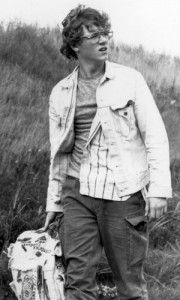Lonesome Death of a Teen Actor
 I never watched the Canadian TV show “Degrassi Junior High,” which the CBC broadcast from 1987-91, but I’ve been very touched by two recent articles about the strange, sad death of one of its teenage stars, Neil Hope, who played the character “Wheels.” Hope died alone in a Hamilton, Ontario rooming house in 2007, and was buried in an unmarked grave; surviving family members only recently learned of his lonesome passing at age 35.
I never watched the Canadian TV show “Degrassi Junior High,” which the CBC broadcast from 1987-91, but I’ve been very touched by two recent articles about the strange, sad death of one of its teenage stars, Neil Hope, who played the character “Wheels.” Hope died alone in a Hamilton, Ontario rooming house in 2007, and was buried in an unmarked grave; surviving family members only recently learned of his lonesome passing at age 35.
In a piece for Newsweek/Daily Beast, Glynnis MacNicol, a Canadian writer living in New York, writes
“It’s painful to imagine anyone’s life ending on such a sad, unobserved note—but doubly so when one considers how deeply Hope’s TV persona resonated with an entire generation of Canadians. . . . Unlike their American counterparts, Degrassi kids were not a pretty or polished group. They looked pretty much like any other group of kids at that age at that time. They looked like the kids you went to school with. And they might have been; for the most part the producers of the show cast regular kids with no acting experience. As one of my Canadian friends put it to me when I broke the news to her, ‘Nobody on Degrassi was perfect. Everyone was ugly, full of embarrassing hair, zits, glasses. The girl in the wheelchair was really in the wheelchair. . . . It was honest.’”
MacNicol explains that the program was a realistic, veritable docudrama, about a group of Toronto adolescents struggling with the rites of passage that young people sometimes experience–substance abuse, pregnancy, and alienation from their families. In a New York Times obituary published this week, five years after the death of its subject, reporter Paul Vitello writes
“‘Wheels’ was a boy who stumbles through misfortunes before drifting into alcoholism, [drawn] broadly on the life of Mr. Hope, who never had formal acting training. . . . After the show’s end in 1991, [he] spoke openly about the wages of alcoholism, revealing that he was the child of alcoholics who had virtually abandoned him and had fed their drinking on his TV earnings. He said he wanted to convey a message to other teenagers whose parents were substance abusers: ‘It’s nothing to be ashamed of. Because it’s not your fault.'”
He was 19 when the program’s run ended.


Leave a Reply
Want to join the discussion?Feel free to contribute!